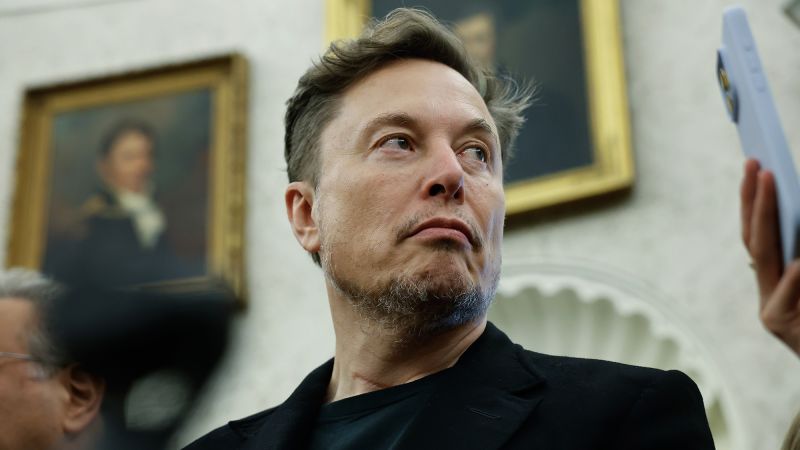Elon Musk’s plan for saving Tesla is blowing up faster than aSpaceX rocket.
It was supposed to go like this: Musk, who became a chainsaw-wielding MAGA acolyte, wouldditch the DC sideshowand get back to business. His empire was flailing without him, and Tesla, especially, was in a tailspin. Investors were clamoring for that old Musk magic torevive salesand pivot the electric vehicle company into an AI juggernaut worthy of its (still lofty) share price.
Turns out, you can take the CEO out of DC but you can’t take the DC out of the CEO.
Tesla (TSLA) isexpected to report yet another quarter of declining global saleson Wednesday, a not-unexpected stumble after months of falling revenue thanks to increased competition in the EV market and no small amount of reputational damage stemming from Musk’s role as President Trump’s“first buddy.”
Now, you might imagine that if you’re the CEO of a company with sales of its core product in rapid decline you’d want to, like, avoid any public squabbles that would further undermine investors’ confidence in your leadership.
Or, you could take the Musk route.
This week, barely a month after he left his role as a special government adviser to focus on reviving Tesla, Musk was once again rolling in the beltway muck, picking another fight with Trump over the president’sdeficit-exploding tax and spending bill.
Musk called Trump’s signature legislation “insane” andthreatened to primaryRepublicans in Congress who vote for it. Trumprespondedwith a suggestion that his administration could investigate Musk’s companies’ government contracts.
(You know, real grown-up stuff.)
“This BFF situation has now turned into a soap opera that remains an overhang on Tesla’s stock,” Wedbush analyst Dan Ives, a longtime Tesla defender, said in a note to clients Tuesday. “Tesla investors want Musk to focus on driving Tesla and stop this political angle… being on Trump’s bad side will not turn out well, and Musk knows this.”
Ives remains bullish on Tesla, but in recent months hehas been speaking outabout the damage Musk’s political swings have done to the company’s image, which isn’t helping the company’s sales problem.
Ahead of Wednesday’s report, analysts had forecast that Tesla sales sank 13% in theApril-June period compared with a year earlier. The consensus from data provider FactSet had Tesla logging 387,000 deliveries in the quarter, compared with 444,000 a year earlier. That could end up being evenworsethan the first quarter, when Tesla reported its sharpest year-over-yearsales decline ever.
Sales are hardly Tesla’s only problem.
The company saw a 71% drop in net income in the first quarter. Its showrooms have been pummeled with protests. The Cybertruck is a flop. Republicans and Democrats say they are less likely to buy a Tesla now than they were before Musk’s stint in the White House, according to a newElectric Vehicle Intelligence Reportreleased Tuesday.
And, as my colleagueChris Isidore reportedlast month, it’s actually worse than all of that.
If you look closely at Tesla’s first-quarter earnings, you’ll see that Tesla islosingmoney on what should be its core business: selling cars. In short, Tesla only managed a $409 million profit last quarter thanks to the sale of $595 million worth of regulatory credits to other automakers.
But if Trump succeeds in passing his signature spending bill, those credits will evaporate.
That’s just one of many reasons investors like Ives are hoping that Musk and Trump can bury the hatchet (or, at the very least, that Musk can keep his mouth shut for five minutes).
Tesla relies on credits to stay profitable, but it also needs favorable regulations just to give it a fighting chance at competing with rivals like Waymo, the Alphabet-owned driverless taxi company that’salready running circlesaround Tesla.
Tesla shares, the backbone of Musk’s personal fortune, are down 37% from their post-election peak, when Musk was becoming a fixture at Mar-a-Lago. The thinking on Wall Street back then was that Tesla’s problems were manageable,and that any blowback from the company’s liberal base would be outweighed by the benefit of having Musk in the White House, influencing regulations.
It might have worked, briefly. But the pair’s falling out now has investors worried Trump will aim his retribution directly at Tesla.
As the Musk-Trump feud reignited Monday, Tesla shares sank 2%. They fell another 5% on Tuesday, missing out on the broader stock market rally.
The message may be getting through to Musk. After Trump commented that DOGE, the committee Musk set up to slash the federal bureaucracy, could be a “monster” that will “go back and eat Elon,” Musk seemed to hold back. Kind of.
“So tempting to escalate this. So, so tempting,” he wrote on X. “But I will refrain for now.”
